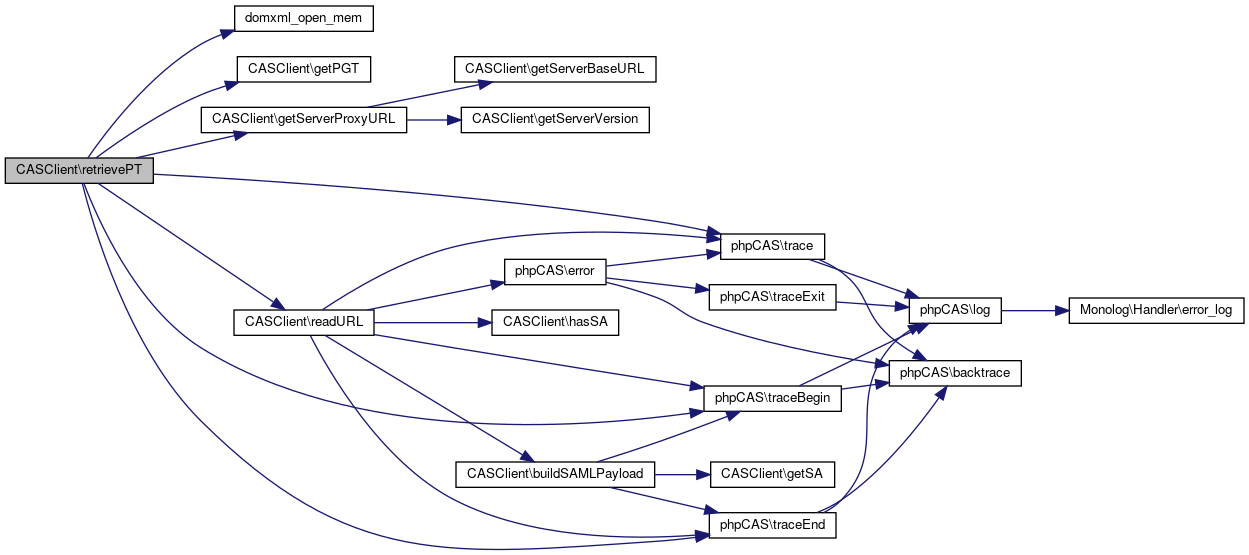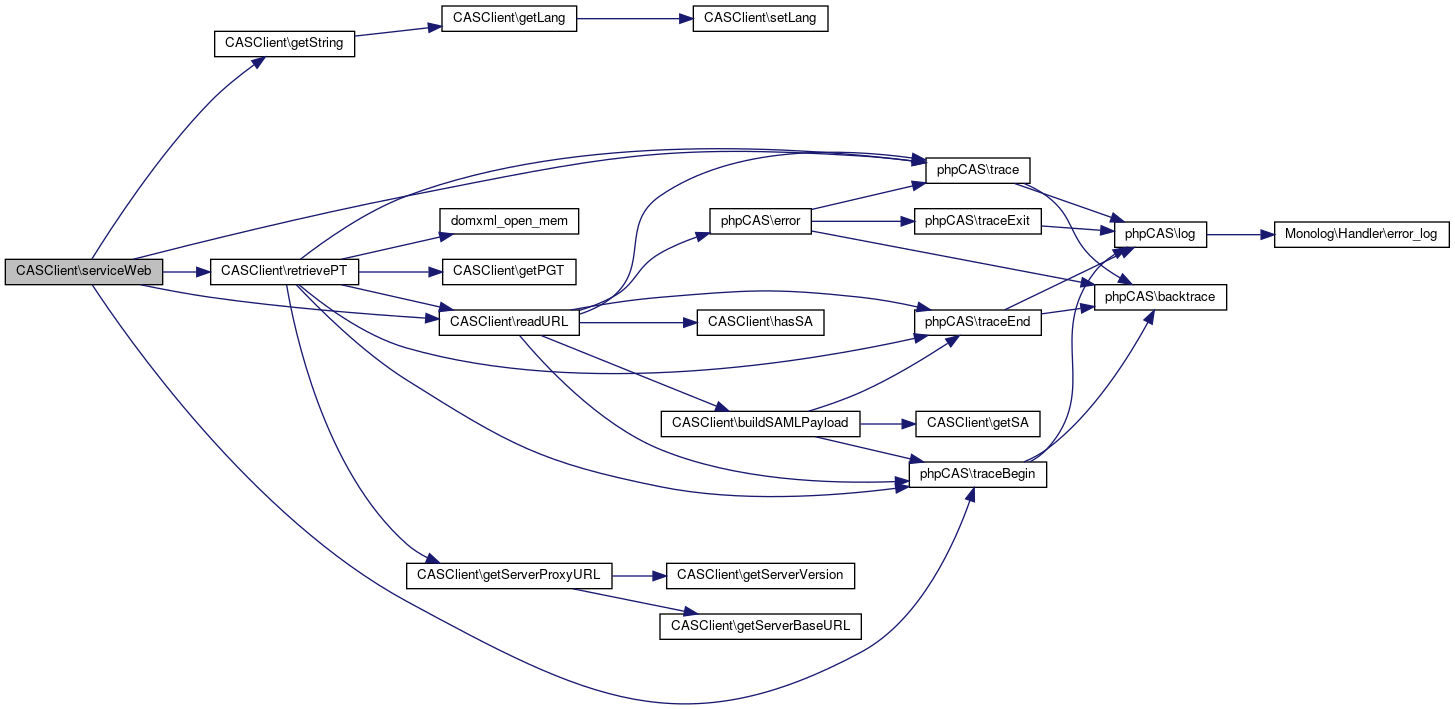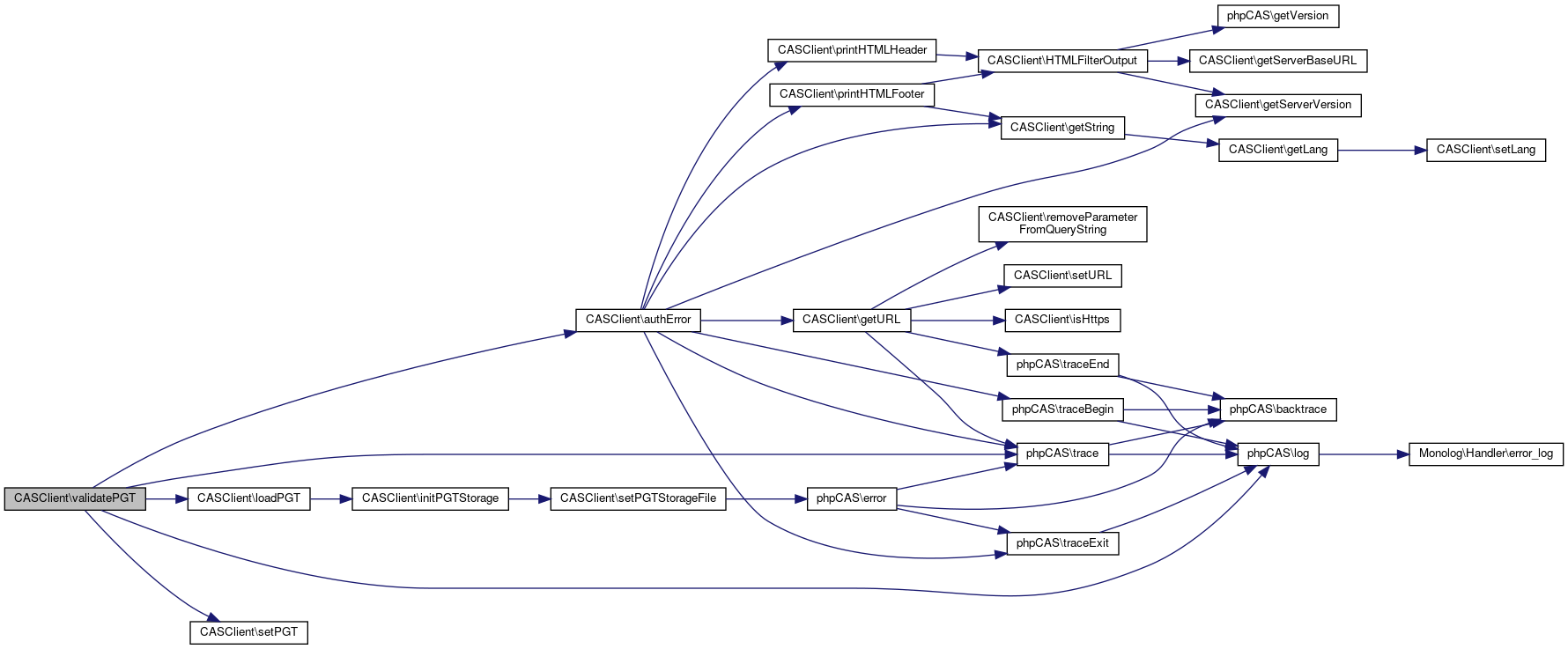 Collaboration diagram for PGT storage:
Collaboration diagram for PGT storage:Modules | |
| PGT storage in a database | |
| PGT storage on the filesystem | |
Data Structures | |
| class | PGTStorage |
| The PGTStorage class is a generic class for PGT storage. More... | |
Functions | |
| CASClient::initPGTStorage () | |
| This method is used to initialize the storage of PGT's. More... | |
| CASClient::storePGT ($pgt, $pgt_iou) | |
| This method stores a PGT. More... | |
| CASClient::loadPGT ($pgt_iou) | |
| This method reads a PGT from its Iou and deletes the corresponding storage entry. More... | |
| CASClient::setPGTStorageFile ($format='', $path='') | |
| This method is used to tell phpCAS to store the response of the CAS server to PGT requests onto the filesystem. More... | |
| CASClient::setPGTStorageDB ($user, $password, $database_type, $hostname, $port, $database, $table) | |
| This method is used to tell phpCAS to store the response of the CAS server to PGT requests into a database. More... | |
| CASClient::validatePGT (&$validate_url, $text_response, $tree_response) | |
| This method is used to validate a PGT; halt on failure. More... | |
| CASClient::retrievePT ($target_service, &$err_code, &$err_msg) | |
| This method is used to retrieve PT's from the CAS server thanks to a PGT. More... | |
| CASClient::readURL ($url, $cookies, &$headers, &$body, &$err_msg) | |
| This method is used to acces a remote URL. More... | |
| CASClient::buildSAMLPayload () | |
| This method is used to build the SAML POST body sent to /samlValidate URL. More... | |
| CASClient::_curl_read_headers ($ch, $header) | |
| CASClient::serviceWeb ($url, &$err_code, &$output) | |
| This method is used to access an HTTP[S] service. More... | |
| CASClient::serviceMail ($url, $service, $flags, &$err_code, &$err_msg, &$pt) | |
| This method is used to access an IMAP/POP3/NNTP service. More... | |
| PGTStorage::PGTStorage ($cas_parent) | |
| The constructor of the class, should be called only by inherited classes. More... | |
| PGTStorage::getStorageType () | |
| This virtual method returns an informational string giving the type of storage used by the object (used for debugging purposes). More... | |
| PGTStorage::getStorageInfo () | |
| This virtual method returns an informational string giving informations on the parameters of the storage. More... | |
| PGTStorage::setErrorMessage ($error_message) | |
| This method sets en error message, which can be read later by PGTStorage::getErrorMessage(). More... | |
| PGTStorage::getErrorMessage () | |
| This method returns an error message set by PGTStorage::setErrorMessage(). More... | |
| PGTStorage::isInitialized () | |
| This method tells if the storage has already been intialized. More... | |
| PGTStorage::init () | |
| This virtual method initializes the object. More... | |
| PGTStorage::write ($pgt, $pgt_iou) | |
| This virtual method stores a PGT and its corresponding PGT Iuo. More... | |
| PGTStorage::read ($pgt_iou) | |
| This virtual method reads a PGT corresponding to a PGT Iou and deletes the corresponding storage entry. More... | |
| CASClient::serviceMail ($url, $flags, &$err_code, &$err_msg, &$pt) | |
| This method is used to access an IMAP/POP3/NNTP service. More... | |
Variables | |
| CASClient::$_pgt_storage | |
| an instance of a class inheriting of PGTStorage, used to deal with PGT storage. More... | |
| CASClient::$_curl_headers = array() | |
| This method is the callback used by readURL method to request HTTP headers. More... | |
| PGTStorage::$_error_message | |
| string used to store an error message. More... | |
| PGTStorage::$_initialized | |
| a boolean telling if the storage has already been initialized. More... | |
Detailed Description
Function Documentation
◆ _curl_read_headers()
| CASClient::_curl_read_headers | ( | $ch, | |
| $header | |||
| ) |
Definition at line 2277 of file client.php.
References $header.
◆ buildSAMLPayload()
|
private |
This method is used to build the SAML POST body sent to /samlValidate URL.
- Returns
- the SOAP-encased SAMLP artifact (the ticket).
Definition at line 2259 of file client.php.
References SAML_SOAP_ENV, phpCAS\traceBegin(), and phpCAS\traceEnd().
 Here is the call graph for this function:
Here is the call graph for this function:◆ getErrorMessage()
| PGTStorage::getErrorMessage | ( | ) |
This method returns an error message set by PGTStorage::setErrorMessage().
- Returns
- an error message when set by PGTStorage::setErrorMessage(), FALSE otherwise.
- Deprecated:
- not used.
Definition at line 135 of file pgt-main.php.
References PGTStorage\$_error_message.
◆ getStorageInfo()
| PGTStorage::getStorageInfo | ( | ) |
This virtual method returns an informational string giving informations on the parameters of the storage.
(used for debugging purposes).
Reimplemented in PGTStorageDB, PGTStorageFile, PGTStorageDB, and PGTStorageFile.
Definition at line 93 of file pgt-main.php.
References phpCAS\error().
 Here is the call graph for this function:
Here is the call graph for this function:◆ getStorageType()
| PGTStorage::getStorageType | ( | ) |
This virtual method returns an informational string giving the type of storage used by the object (used for debugging purposes).
Reimplemented in PGTStorageDB, PGTStorageFile, PGTStorageDB, and PGTStorageFile.
Definition at line 82 of file pgt-main.php.
References phpCAS\error().
 Here is the call graph for this function:
Here is the call graph for this function:◆ init()
|
protected |
This virtual method initializes the object.
Reimplemented in PGTStorageDB, PGTStorageFile, PGTStorageDB, and PGTStorageFile.
Definition at line 170 of file pgt-main.php.
◆ initPGTStorage()
|
private |
This method is used to initialize the storage of PGT's.
Halts on error.
Definition at line 1889 of file client.php.
◆ isInitialized()
|
protected |
This method tells if the storage has already been intialized.
- Returns
- a boolean
Definition at line 160 of file pgt-main.php.
References PGTStorage\$_initialized.
Referenced by PGTStorageDB\init(), and PGTStorageFile\init().
 Here is the caller graph for this function:
Here is the caller graph for this function:◆ loadPGT()
|
private |
This method reads a PGT from its Iou and deletes the corresponding storage entry.
- Parameters
-
$pgt_iou the PGT Iou
- Returns
- The PGT corresponding to the Iou, FALSE when not found.
Definition at line 1925 of file client.php.
◆ PGTStorage()
|
protected |
The constructor of the class, should be called only by inherited classes.
- Parameters
-
$cas_parent the CASclient instance that creates the current object.
Definition at line 63 of file pgt-main.php.
References phpCAS\error(), phpCAS\traceBegin(), and phpCAS\traceEnd().
Referenced by PGTStorageDB\PGTStorageDB(), and PGTStorageFile\PGTStorageFile().
 Here is the call graph for this function:
Here is the call graph for this function: Here is the caller graph for this function:
Here is the caller graph for this function:◆ read()
|
protected |
This virtual method reads a PGT corresponding to a PGT Iou and deletes the corresponding storage entry.
- Note
- Should never be called.
- Parameters
-
$pgt_iou the PGT iou
Reimplemented in PGTStorageFile, and PGTStorageFile.
Definition at line 202 of file pgt-main.php.
References phpCAS\error().
 Here is the call graph for this function:
Here is the call graph for this function:◆ readURL()
|
private |
This method is used to acces a remote URL.
- Parameters
-
$url the URL to access. $cookies an array containing cookies strings such as 'name=val' $headers an array containing the HTTP header lines of the response (an empty array on failure). $body the body of the response, as a string (empty on failure). $err_msg an error message, filled on failure.
- Returns
- TRUE on success, FALSE otherwise (in this later case, $err_msg contains an error message).
Definition at line 2163 of file client.php.
References $data, $res, $url, phpCAS\error(), phpCAS\trace(), phpCAS\traceBegin(), and phpCAS\traceEnd().
Referenced by CASClient\validateST().
 Here is the call graph for this function:
Here is the call graph for this function: Here is the caller graph for this function:
Here is the caller graph for this function:◆ retrievePT()
|
private |
This method is used to retrieve PT's from the CAS server thanks to a PGT.
- Parameters
-
$target_service the service to ask for with the PT. $err_code an error code (PHPCAS_SERVICE_OK on success). $err_msg an error message (empty on success).
- Returns
- a Proxy Ticket, or FALSE on error.
Definition at line 2053 of file client.php.
References domxml_open_mem(), phpCAS\trace(), phpCAS\traceBegin(), and phpCAS\traceEnd().
 Here is the call graph for this function:
Here is the call graph for this function:◆ serviceMail() [1/2]
| CASClient::serviceMail | ( | $url, | |
| $flags, | |||
| & | $err_code, | ||
| & | $err_msg, | ||
| & | $pt | ||
| ) |
This method is used to access an IMAP/POP3/NNTP service.
- Parameters
-
$url a string giving the URL of the service, including the mailing box for IMAP URLs, as accepted by imap_open(). $flags options given to imap_open(). $err_code an error code Possible values are PHPCAS_SERVICE_OK (on success), PHPCAS_SERVICE_PT_NO_SERVER_RESPONSE, PHPCAS_SERVICE_PT_BAD_SERVER_RESPONSE, PHPCAS_SERVICE_PT_FAILURE, PHPCAS_SERVICE_NOT AVAILABLE. $err_msg an error message on failure $pt the Proxy Ticket (PT) retrieved from the CAS server to access the URL on success, FALSE on error).
- Returns
- an IMAP stream on success, FALSE otherwise (in this later case, $err_code gives the reason why it failed and $err_msg contains an error message).
Definition at line 1633 of file client.php.
◆ serviceMail() [2/2]
| CASClient::serviceMail | ( | $url, | |
| $service, | |||
| $flags, | |||
| & | $err_code, | ||
| & | $err_msg, | ||
| & | $pt | ||
| ) |
This method is used to access an IMAP/POP3/NNTP service.
- Parameters
-
$url a string giving the URL of the service, including the mailing box for IMAP URLs, as accepted by imap_open(). $service a string giving for CAS retrieve Proxy ticket $flags options given to imap_open(). $err_code an error code Possible values are PHPCAS_SERVICE_OK (on success), PHPCAS_SERVICE_PT_NO_SERVER_RESPONSE, PHPCAS_SERVICE_PT_BAD_SERVER_RESPONSE, PHPCAS_SERVICE_PT_FAILURE, PHPCAS_SERVICE_NOT AVAILABLE. $err_msg an error message on failure $pt the Proxy Ticket (PT) retrieved from the CAS server to access the URL on success, FALSE on error).
- Returns
- an IMAP stream on success, FALSE otherwise (in this later case, $err_code gives the reason why it failed and $err_msg contains an error message).
Definition at line 2381 of file client.php.
◆ serviceWeb()
| CASClient::serviceWeb | ( | $url, | |
| & | $err_code, | ||
| & | $output | ||
| ) |
This method is used to access an HTTP[S] service.
- Parameters
-
$url the service to access. $err_code an error code Possible values are PHPCAS_SERVICE_OK (on success), PHPCAS_SERVICE_PT_NO_SERVER_RESPONSE, PHPCAS_SERVICE_PT_BAD_SERVER_RESPONSE, PHPCAS_SERVICE_PT_FAILURE, PHPCAS_SERVICE_NOT AVAILABLE. $output the output of the service (also used to give an error message on failure).
- Returns
- TRUE on success, FALSE otherwise (in this later case, $err_code gives the reason why it failed and $output contains an error message).
Definition at line 2298 of file client.php.
References $_SESSION, $res, $url, CAS_STR_SERVICE_UNAVAILABLE, phpCAS\trace(), and phpCAS\traceBegin().
 Here is the call graph for this function:
Here is the call graph for this function:◆ setErrorMessage()
|
protected |
This method sets en error message, which can be read later by PGTStorage::getErrorMessage().
- Parameters
-
$error_message an error message
- Deprecated:
- not used.
Definition at line 121 of file pgt-main.php.
◆ setPGTStorageDB()
| CASClient::setPGTStorageDB | ( | $user, | |
| $password, | |||
| $database_type, | |||
| $hostname, | |||
| $port, | |||
| $database, | |||
| $table | |||
| ) |
This method is used to tell phpCAS to store the response of the CAS server to PGT requests into a database.
- Note
- The connection to the database is done only when needed. As a consequence, bad parameters are detected only when initializing PGT storage.
- Parameters
-
$user the user to access the data with $password the user's password $database_type the type of the database hosting the data $hostname the server hosting the database $port the port the server is listening on $database the name of the database $table the name of the table storing the data
Definition at line 1971 of file client.php.
References phpCAS\error().
 Here is the call graph for this function:
Here is the call graph for this function:◆ setPGTStorageFile()
| CASClient::setPGTStorageFile | ( | $format = '', |
|
$path = '' |
|||
| ) |
This method is used to tell phpCAS to store the response of the CAS server to PGT requests onto the filesystem.
- Parameters
-
$format the format used to store the PGT's (‘plain’ and ‘xml’ allowed) $path the path where the PGT's should be stored
Definition at line 1942 of file client.php.
References $path, and phpCAS\error().
 Here is the call graph for this function:
Here is the call graph for this function:◆ storePGT()
|
private |
This method stores a PGT.
Halts on error.
- Parameters
-
$pgt the PGT to store $pgt_iou its corresponding Iou
Definition at line 1908 of file client.php.
◆ validatePGT()
|
private |
This method is used to validate a PGT; halt on failure.
- Parameters
-
$validate_url the URL of the request to the CAS server. $text_response the response of the CAS server, as is (XML text); result of CASClient::validateST() or CASClient::validatePT(). $tree_response the response of the CAS server, as a DOM XML tree; result of CASClient::validateST() or CASClient::validatePT().
- Returns
- bool TRUE when successfull, halt otherwise by calling CASClient::authError().
Definition at line 2007 of file client.php.
References phpCAS\log(), and phpCAS\trace().
Referenced by CASClient\isAuthenticated().
 Here is the call graph for this function:
Here is the call graph for this function: Here is the caller graph for this function:
Here is the caller graph for this function:◆ write()
|
protected |
This virtual method stores a PGT and its corresponding PGT Iuo.
- Note
- Should never be called.
- Parameters
-
$pgt the PGT $pgt_iou the PGT iou
Reimplemented in PGTStorageFile, and PGTStorageFile.
Definition at line 188 of file pgt-main.php.
References phpCAS\error().
 Here is the call graph for this function:
Here is the call graph for this function:Variable Documentation
◆ $_curl_headers
| CASClient::$_curl_headers = array() |
This method is the callback used by readURL method to request HTTP headers.
Definition at line 2276 of file client.php.
◆ $_error_message
|
private |
string used to store an error message.
Written by PGTStorage::setErrorMessage(), read by PGTStorage::getErrorMessage().
- Deprecated:
- not used.
Written by PGTStorage::setErrorMessage(), read by PGTStorage::getErrorMessage().
- Deprecated:
- not used.
Definition at line 110 of file pgt-main.php.
Referenced by PGTStorage\getErrorMessage().
◆ $_initialized
|
private |
a boolean telling if the storage has already been initialized.
Written by PGTStorage::init(), read by PGTStorage::isInitialized().
Definition at line 151 of file pgt-main.php.
Referenced by PGTStorage\isInitialized().
◆ $_pgt_storage
|
private |
an instance of a class inheriting of PGTStorage, used to deal with PGT storage.
Created by CASClient::setPGTStorageFile() or CASClient::setPGTStorageDB(), used by CASClient::setPGTStorageFile(), CASClient::setPGTStorageDB() and CASClient::initPGTStorage().
Definition at line 1881 of file client.php.

















